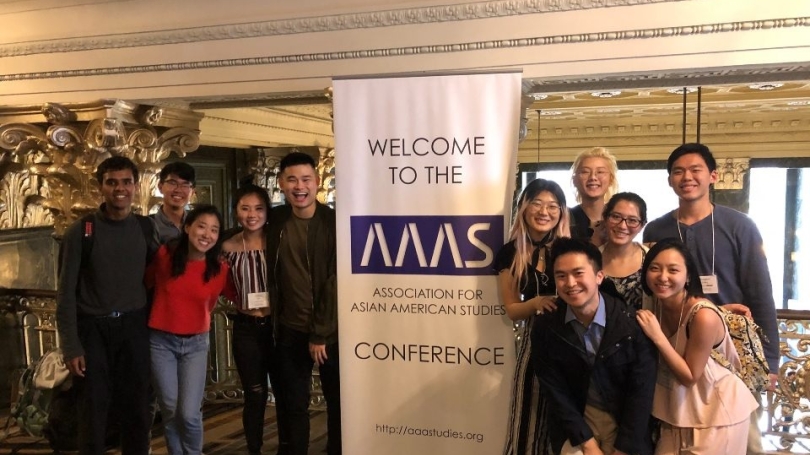
- Public Policy
- Leadership
- Funding
- News & Events
- About the Center
Back to Top Nav
Back to Top Nav
Back to Top Nav
Back to Top Nav
Todd Huang '19 shares his experience after attending the Association for Asian American Studies Conference in San Francisco.
I was able to interact with academics from across the nation specializing in work that can be described as Asian Americanist. I was exposed to a wide variety of disciplines within the broad field of Asian American studies; academics specialized in cultural studies, literature, film studies, sociology, geography, political science, and history using theories like feminist theory, queer theory, disability theory, postcolonial theory, Marxist theory among others.
Asian American studies is a fundamentally interdisciplinary field that investigates anything from the construction of the human to immigration policy using an Asian American lens. The topic being studied is investigated using the Asian American as an intellectual framework. This conference allowed me to be exposed to the robustness of this framework, where scholars from the United States and Canada came together to showcase their research and learn from their peers.
As an undergraduate student, I was able to sit in on panels and roundtables to listen to enlightening lectures and fruitful discussions that challenged me to think more about the world. In particular, I was especially captivated by discussions of Asian settler colonialism, indigeneity, and state formations.
At one specific panel about gentrification and settler colonialism, a graduate student from the University of California, Los Angeles described their research on gentrification of Chinatown and its relation to settler colonial logics. As part of their research, they argued that the disappearance of a community is only remembered if the people of the community are able to convert their trauma into capital. In this case, the Chinese residents of Chinatown create small businesses like restaurants to “sell” their cultural capital. On the other hand, the indigenous peoples of that land before urbanization were unable to capitalize on their trauma because they were forcibly removed from the land by white settlers. Thus, their image is not remembered in the same way of that of the Chinese. This small excerpt of their research allowed me to think of Asian American studies in terms of comparative racialization and racial triangulation.
This trip has allowed me to parse out my senior thesis in geography. I plan to write a thesis on the flow of Chinese capital into Vancouver real estate, and the impacts that has on gentrification and settler colonialism. With the panels on settler colonialism, gentrification, and transpacific studies, I am now able to think more fully on what I want my thesis to look like. The ability to meet other academics also makes me more secure in pursuing a Ph.D. in geography where I hope to contribute to this growing body of research. I hope to specialize in the study of Asia Pacific capitalism and its impacts on gentrification and settler colonialism.
-Submitted by Todd Huang '19, Rockefeller Center Mini Grant Recipient
The Rockefeller Center's Mini-Grants program funds registration fees for students attending conferences, as well as the costs of bringing guest speakers to Dartmouth. The views and opinions expressed here are the author’s own and do not necessarily represent the views and opinions of the Rockefeller Center or constitute an endorsement by the Center.